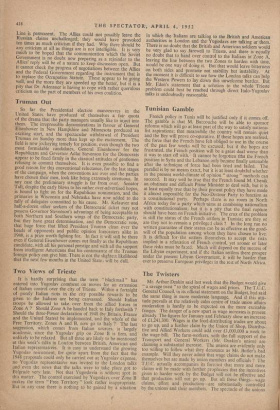Russia, the West and Germany
Some of the West German criticism of the Allied reply to the recent Soviet Note on a peace treaty with Germany is curiously perverse. (East German criticisms were too inevitable to be seriously considered. The reply was known to have been approved by Dr. Adenauer before it was despatched; that was enough in itself to prejudice Dr. Schumacher's Social Demo- cratic Party against it.) There is no doubt that a desire for a reunited Germany is the ruling passion in Western Germany, and the Soviet Note was dexterously framed to Inake a strong appeal to that. But the temptation to take short cuts and dis- cuss all contentious questions at once must be resisted. The Allies took the only possible line in insisting that the first step must be the holding of free and secret elections throughout Germany. Only an elected body resulting from that process could have authority to negotiate any peace treaty at all. Criti- cisms of the Allies for raising so controversial an issue as the Oder-Neisse Line are surprising. It was, in fact, not the Allies who raised it but the Russians in their original Note. The rele- vant passage reads textually, " The territory of Germany is determined by frontiers laid down by the decisions of the Potsdam Conference of the Great Powers." But the Great Powers at Potsdam deliberately avoided fixing the frontiers of Germany definitively. What was said was that " pending the final determination of Poland's western frontier " the former German territories east of the Oder-Neisse Line should be under the administration of the Polish State. The studied assumption in the Russian Note is that the Oder-Neisse Lino is already fixed. Poland naturally desires it so. So do its patrons in the Kremlin. So, of necessity, do the Ministers in the East German Government; the Kremlin sees to that. But the bulk of East Germans are the last of all people to be reconciled to the loss of territories further east, and virtually all West Germans resist the claim that the Oder-Neisse Line is permanent. The Allies could not possibly leave the Russian claims unchallenged; they would have provoked ten times as much criticism if they had Why there should be any criticism at all as things are is not intelligible. It is very much to be hoped that the communication which the Soviet Government is no doubt now preparing as, a rejoinder to the Allies' reply will be of a nature to keep discussion open. But it cannot check the progress of negotiations between the Allies and the Federal Government regarding the instrument that is to replace the Occupation Statute. These appear to be going well, and the more they are speeded up the better, but it is a pity that Dr. Adenauer is having to cope with rather querulous criticism on the part of members of his own coalition.



























































 Previous page
Previous page